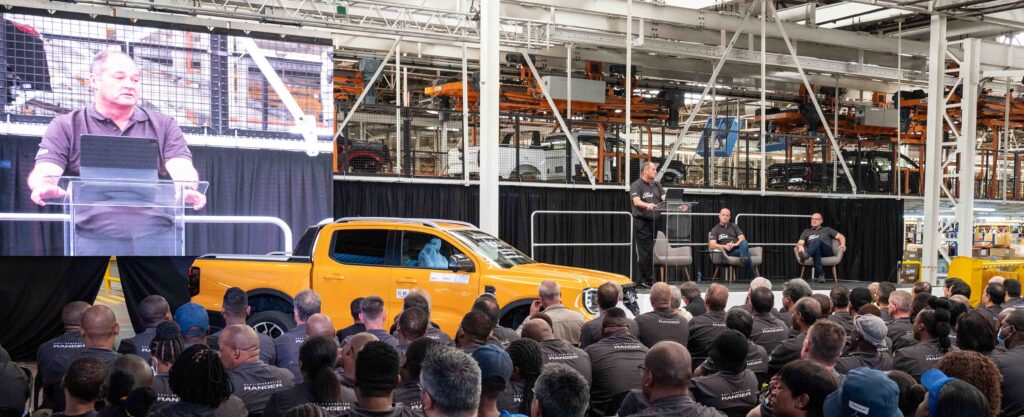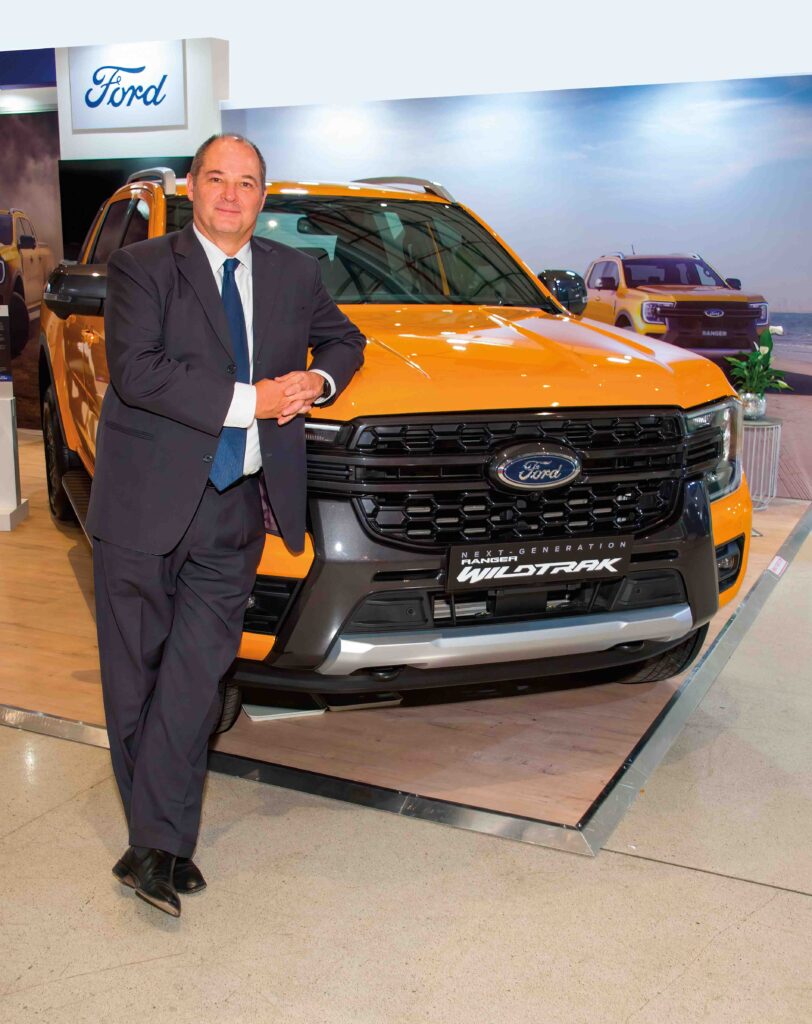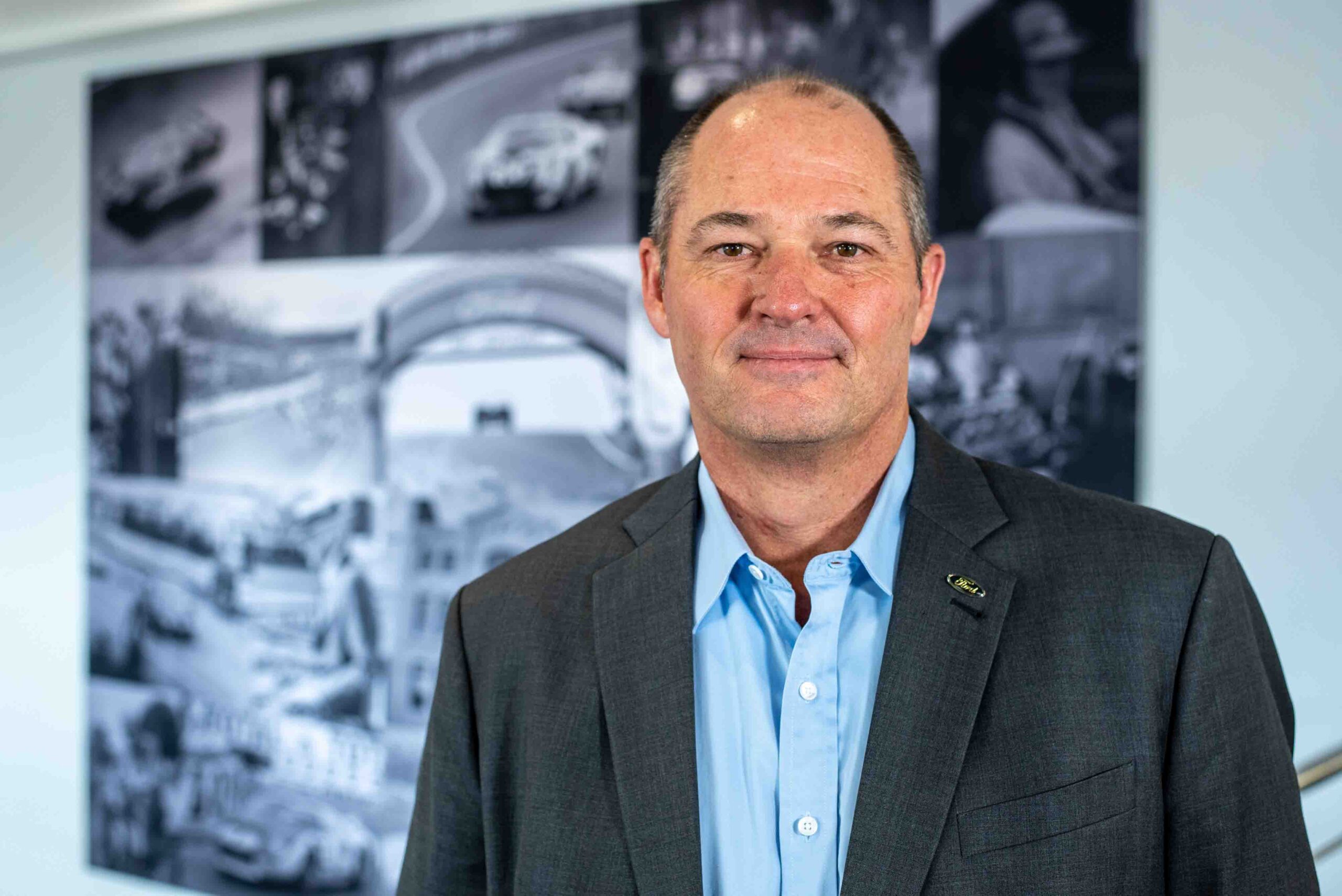Leadership Editor Prof. Onkgopotse JJ Tabane had a long lunch with the President of Ford Motor Company Africa, Neale Hill, to discuss the challenges facing the economy and the automotive industry
Neale Hill has been with the Ford Motor Company in various capacities for over 32 years. His passion for the industry comes through in his articulation about how he has a deep desire to contribute to the growth of South Africa.
Hill, who also holds the position of President of NAAMSA, has very strong views about what needs to be done to fix the industry and South Africa. He believes that all sectors of society need to raise their hand in contributing solutions to fix what is wrong in the system. He believes that policy certainty for the economy to grow and innovation in line with future trends are what is needed. Last year in November, the industry met with the Department of Trade, Industry, and Competition (DTIC) to present a case that shows there is an urgent need to develop an electric vehicle framework for South Africa. They shared fiscal projections that show the difference between a clear policy environment and a non-policy environment.The situation is incomparable, Hill says. There is likely a capacity concern within the DTIC to oversee an industry that contributes some 5% to the GDP. Hill believes that for an industry of such significance, the Department should be laser-focused on supporting it. It feels like there may be a need for delegation within the DTIC–a catalyst that would propel all the exciting DTIC masterplans forward. The capacity of the DTIC comes into focus again during the discussion of Inter-Africa trade.
Hill decries poor regional and inter-regional trade. He believes that Zimbabwe’s decision to restrict exports of lithium for the manufacturing of batteries for electrical vehicles is a good policy decision. This he believes should be part of the measures to incentivise foreign direct investors to set up manufacturing capacity ahead of the electric car explosion on the continent. Hill believes that more progress needs to be made to put African trade into practice. Ford has a poor presence and footprint in Africa, with various agents selling its brand in different markets. In terms of key solutions, Africa is a tough market.
He reflects on some of the lessons that led to Ford closing its semi-knock down (SKD) operations in Kenya, but this setback has not discouraged their expansion plans in Africa. The transport flexibility and efficiency of moving goods across the continent remains one of the biggest impediments to intra Africa trade. This is a matter that he hopes the Africa Trade Agreement will soon tackle with more seriousness. Hill admits that the motor industry can do more to accelerate transformation in the sector. He includes Ford.
Asked about his EXCO, he tells me that his team of close to 20 is diverse and still changing. Ford has taken a clear stance on succession planning, but his big emphasis is global exposure, and he is on a mission to make sure that identified talent in the line of succession are given exposure to other markets and operations where Ford exist. Such programmes, he reiterates, are easier said than done. When the day comes to pay for a flight ticket and five months accommodation abroad, it’s a face-off with the CFO. But this he believes is an investment worth making in key talent. Hill himself was given huge opportunities to work in Ford operations across the world. This has prepared him for his current position. Hill believes in investing in his staff and has a simple leadership philosophy: he wouldn’t ask anyone who works for him to do something he himself would not do.
As President of NAAMSA, Hill takes on a bigger leadership responsibility beyond Ford. He believes that areas such as road infrastructure have seen some notable successes. He commends SANRAL for great corridors such as the N6. He strongly believes that the establishment of a strong rail network from the port of Gqeberha would complement the Durban port traffic, but it requires decisiveness among social partners for such an investment to happen. The use of trucks to transport exports to the ports inhibits real growth and is not sustainable. A delay as a result of something akin to the N3 blockade or Transnet strike can wipe out entire businesses.
The question of investing in proper infrastructure will remain one of the biggest downfalls of the economy. Finally, Hill is excited about Ford’s prospects for 2023. The Ford Ranger has taken the market by storm, with a very long waiting list demonstrating a big uptake by the market. Sadly, Ford globally is moving away from passenger cars, with the Fiesta, for example, a victim of its own success, as Ford spec’d it to match cars in higher luxury categories – making it as popular as it was locally.
Hill in his own words
On the current investment climate…
Any company that deals with multinationals is concerned about investment in growth. We have investment choices. We don’t have to invest in South Africa. We could invest in Thailand or any country in the world. It becomes a business decision where we do a comparison; what is the cost of producing and exporting? Then it becomes about dollars and cents.
On the energy crisis…
When you are running at Stage 6 loadshed–ding, and you have a 12-hour outage, you look at this and you go… “Why is South Africa a good destination?”. The track record of South Africa against the promises it has made has been very poor. Eskom is essential to South Africa’s survival.
On electric vehicles…
How do we participate in the electric vehicle future when there is no country policy? We need a government position on electric vehicles. Countries are already doing measurements of carbon emissions as ways of managing your fleet. The US, for example, is incentivising its citizens to switch to electric vehicles. Customer pull or demand push—there is no availability at this stage. Our investment cycle requires that there is clarity, otherwise companies will look elsewhere about where investment distributions for electric vehicles is going to be.

On Africa and the EU…
The AU needs to follow what Zimbabwe has done around bringing in experts if there is no local beneficiation. South Africa can no longer use the sympathetic vote of the ‘Rainbow Nation’ as a draw card for investment. We were Africa’s biggest economy; we are now Africa’s third largest economy. This has been a steady decline. We have low investor confidence. What needs to be done? Well, there is not much more that business can do. There is a feeling in business that our calls are falling on deaf ears. We consistently engage with the government to showcase what a real proper operation is about, including a tour to ports abroad. We remain with a lot of concerns. We have up to eight master plans. The problem is that Minister Patel attempts to oversee all the master plans. A lot more efficient approach is required.
On the leadership deficit…
We need to invest in our staff to create leadership. Leadership is about trusting your people. You have to give your trust to people and allow them to grow.
On government regulation…
We need to get the rhythm of government regulation right. Tell us the rules and we will implement in a way that makes sense. An example is the implementation of BEE rules. We are suddenly penalised for suppliers that don’t comply. Multinational suppliers do not bother to comply, making implementing localisation impossible. A poor definition of the rules has unintended consequences.
On transformation…
Transformation is not an inconvenience and as an industry we have to do better and work harder. Ford have taken a conscious decision to accelerate transformation. We believe we need to be representative of the economically active population. This must also be gender biased. At the moment we have a gender imbalance in the organisation. In Ford EXCO, we have probably a 50/50 representative, including a similar scenario in our board of directors. We are pursuing advanced development programmes in order to strengthen our talent pipeline. We are focusing on succession planning and self-development as part of this commitment to transformation. We also want staff to get international exposure and get out of their comfort zone to learn a whole lot of new skills. My own connection and exposure in Thailand and China were invaluable. This is key in people development.
On African trade…
How do we benefit the citizens of Africa? We need a connected rail system to move goods efficiently across the continent. Markets are looking for that kind of efficiency. The Africa Trade Agreement needs to deal with this urgently. We need to unleash the potential of 1.2 billion people. The potential of our young population is also crucial. The dawn of technology has huge benefits for our growth.
Prof. Onkgopotse JJ Tabane is the Editor of Leadership magazine. He is also the host of ‘Power To Truth’ on ENCA, Mondays to Wednesdays at 8pm.

Who is Neale Hill?
Neale Hill was appointed President of Ford Motor Company Africa on 1 October 2021. He leads the company’s strategic drive to transform and modernise Ford’s business across the African continent. His responsibilities have been expanded to include Southern Africa, Sub-Saharan Africa, as well as North Africa.
He also serves on the boards of Ford Motor Company of Southern Africa and Ford Financial Services South Africa.
Hill was born in 1968 in Durban, KwaZulu-Natal. After matriculating from Westville Boy’s High, he went on to obtain a Bachelor of Social Sciences degree from the University of KwaZulu-Natal.
In 1991, Hill joined Ford as a Graduate Trainee. Less than five months into the programme, he was offered a full-time position and has never looked back.
The first 15 years of Hill’s professional career at Ford were spent in various Marketing, Sales, and Service Management roles. In 2000, he also completed a Strategic Marketing Programme at Duke University’s Fuqua School of Business in Durham, North Carolina, USA.
In 2006, Hill transferred to Ford Asia Pacific and Africa (APA) in Bangkok, Thailand, as Regional Launch Manager for all passenger cars, before being appointed Cross Carline Brand Strategy Manager when the APA office relocated to Shanghai, China.
In 2011, it was time for yet another continent change, and Hill transferred to Auckland as MD of Ford Motor Company of New Zealand. Two years later he relocated to Melbourne to take up his role as GM of Sales at Ford Motor Company of Australia.
In 2016, after a decade abroad, Hill returned to South Africa as Director of Marketing, Sales, and Service at Ford SA and SSA.
In 2018, he was appointed Managing Director (MD) of Ford South Africa and Sub-Saharan Africa (SA and SSA).
In 2019, he was nominated to the position of Vice-President for NAAMSA as one of the four elected office bearers.
in 2021, he was elected as President of NAAMSA.
Hill is married to Wendy. He is a keen golfer. Most holidays are spent in game reserves, with no cellphone reception, where he has a chance to indulge his passion for wildlife photography and bird watching.

